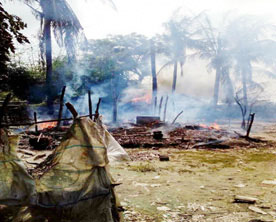A group of ethnic Rakhine lawmakers led by Dr Aye Maung, Chairperson of the Arakan National Party (ANP), met with Myanmar military chief Senior General Min Aung Hlaing to request military help in Rakhine State on August 9, after their proposal regarding the provision of extra security forces had been rejected by Myanmar Parliament dominated by the ruling National League for Democracy (NLD) party.
The unusual meeting between a group of seven members representing an ethnic party and the Defence Services Chief took place in Nay Pyi Taw just a day after the ANP sent a letter to the military requesting the talks following a Bengali terrorist attack that killed eight Myo nationalities in northern Rakhine on August 3. The victims were farmers from Kainggyi village in Maungdaw Township, and the brutal assault took lives of three males and five females while they were engaging in farm work on Mayu Mountain. Myo is a sub-ethnic group of the Rakhine, indigenous to north-eastern part of Rakhine State.
Township to detain suspected terrorists (members of an insurgent group calling itself Arakan Rohingya Salvation Army). Around 600 Bengalis with sticks, knives, catapults and jingalees (a Burmese hand-made iron weapon) launched a concerted fight against the police at about 7.30 am, preventing the suspects from being apprehended. The upheaval saw a series of ethnic nationalities in Maungdaw and Yathedaung townships fleeing from their resident villages in neighbourhood of Mayu Mountain in fear of being attacked and murdered by Bengali terrorists. In Chutepyin, Pyinshae and Padauk Myaing villages, all of the households abandoned their places to seek shelter in larger Cetipyin village in Yathedaung, where there is a police station.
“People have to leave their own places to escape from terrorism as there is no measures to ensure public security. It is because of poor security management of the State Government”, said Than Naing, a representative in Rakhine State Legislature.
Dr Aye Maung said that parliamentarians could debate taking action against Bengali militancy in restless Rakhine under the country’s antiterrorism law. They planned to submit a motion to both houses of Myanmar parliament concerning the security situation in Rakhine State, but it was rejected and thus they decided to approach the Tatmadaw (Armed Forces of Myanmar), he explained.
“It was not possible for us to approach the State Counsellor or the President to discuss the issue, so we have to look for another party that can protect people from being killed,” Dr Aye Maung said, referring to State Counsellor Aung San Suu Kyi and President Htin Kyaw. “The situation in Rakhine State is extremely worrying. Ethnic nationalities are forced to leave their homes. We told the Tatmadaw our concerns,” said Oo Hla Saw, a legislator in Pyithu Hluttaw, lower house of Myanmar’s national-level legislature Pyidaungsu Hluttaw (Assembly of the Union). The ANP, which is the dominant party in Rakhine State Legislature, requested the talks because they believed the Tatmadaw (Myanmar Military) is the only party that has the ability to handle the worrisome security issues in Rakhine, he said.
Weeks prior to the cruel killing of Myo minorities, Myanmar security forces and ethnic community members discovered camps along the Mayu Mountain range believed to be used by Bengali Muslim terrorists for training. Two days after ANP’s meeting with the Senior General Min Aung Hlaing, Office of the State Counsellor issued a press release on August 11 regarding the Muslim attack, after being silent for days following the violence. Titled ‘Press Release on the Situation in Maungdaw’, the statement blamed the culprits and urged the people, political parties, NGOs, friendly countries and international community to show support by opposing the extremist terrorist acts.
On the same day of the meeting between the ANP and the Defence Services Chief, upper house of Myanmar parliament approved a motion submitted by Khin Maung Latt from the Rakhine State constituency 3 representing the ANP to detain and prosecute terrorists active in Maungdaw, Buthidaung and Yathedaung townships in northern Rakhine. The proposal also called on the government to arrange adequate security so that the ethnic minorities who had been forced to flee due to the threat of violence were able to return home.
Before accepting Khin Maung Latt’s motion to debate, a total of five proposals by the ANP in both houses of Myanmar parliament had been rejected by the NLD since it came to power in April 2016, using its dominance of the national-level legislature to frequently bar any opposition’s attempts to present conflict-related topics to the parliament agenda.










